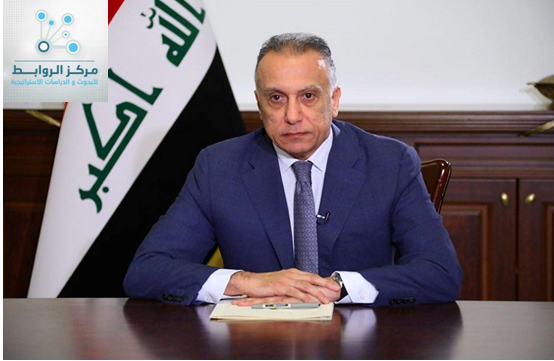As part of its efforts to find a regional role for it, the government of Iraqi Prime Minister Mustafa Al-Kazemi called for a regional conference to discuss the crises and problems of the regional environment countries, at a time when Iraq is still an arena of severe regional and international conflict, amid tensions between the United States of America and Iran.
The Baghdad government has begun its move to host the first conference of Iraq’s regional neighbors at the end of this month, as some of Al-Kazemi’s government envoys conveyed invitations to the leaders of the region’s countries to attend the aforementioned conference, which is scheduled to be held at the summit level and includes the countries neighboring Iraq, in addition. To other countries such as Egypt, the United Arab Emirates and France.
And a statement issued by the Iraqi Prime Minister Monday, after a call between Macron and Mustafa Al-Kazemi, stated that the Iraqi Prime Minister informed Macron that “France is a real partner for Iraq,” while Macron, for his part, announced his “full support for Iraq” and praised “balanced Iraqi diplomacy.” This is Macron’s second visit to Iraq in less than a year, after he visited it last September.
The essence of the call for this regional and international conference is to achieve the public interest and restore Baghdad’s regional role, but its success depends on the independence of the Iraqi decision and its non-subordination to any regional or international player. The Iraq Neighboring Countries Conference, which Mustafa Al-Kazemi called for in light of the difficult circumstances the country is going through, is a good move if it stems from within, because Iraq needs a process of regional communication with neighboring countries and the regional and international environment, and an attempt to gather neighboring and regional parties at one table. Because this will be in his interest in most of the political, security and economic files, so this move, according to the independence of the Iraqi decision, is a positive move, if those countries are able to curb the Iranian dominant role in Iraq and its sovereign decision.
Iraq, which finds itself in a complex situation between its eastern Shiite neighbor and its Sunni neighbor to the south, has been seeking to play the role of mediator at the level of the Middle East since the defeat of ISIS terrorist organization at the end of 2017. Baghdad also hosted at the end of June a tripartite summit that brought together Egyptian President Abdel Fattah al-Sisi And the Jordanian King Abdullah II and Al-Kazemi.
Iraqi officials realize that the road is long, but if Iraq was not able to exert great pressure, it would at least provide an arena for dialogue. Also, Baghdad is one of the few regional capitals that has good relations with neighboring countries. While Baghdad seeks to achieve rapprochement between the allies of the United States of America in the Middle East, namely Saudi Arabia, Jordan and Egypt, it also supports the return of Syria to the Arab League. On the other hand, there have been no talks between Iraq and Saudi Arabia for a long time.
The proposal to hold a regional and international conference at this sensitive time to discuss security, political and economic issues came in line with Al-Kazemi’s awareness of the repercussions that the eastern and regional Arab environment is witnessing, and tensions and fears of a possible confrontation between the West and its allies and Iran against the background of attacks on merchant ships in the Arabian Gulf and the Arabian Sea, which It coincided with the arrival of a new hard-line Iranian president.
The possibilities of a confrontation between the West and its allies and Iran have escalated against the backdrop of terrorist attacks on several ships in the Persian Gulf, which the West accuses of being responsible for, and exposing the safety of navigation and international interests to dangers in a sensitive region for the world. The United States has vowed a collective response with its allies to Iran, while Israeli Prime Minister Naftali Bennett confirmed, in a message to Iran, that “the time to sit comfortably in Tehran and ignite the entire Middle East from there is over,” revealing his entity’s move “to mobilize the world, but in parallel with that.” We also know how to work on our own.”
The call to hold a conference in Baghdad is a qualitative leap that Iraq must benefit from, and the countries that enter with Iraq in such conferences must take into consideration, that this conference was held in order to serve Iraq and the countries of the regional environment in the face of threats and instability and to confront terrorism and projects foreign stranded in Iraq and the Arab countries.
In this conference, and with what Al-Kazemi possesses of a sound patriotic sense, he has the real ability to lead Iraq’s position, in a sovereign manner and independent of Iranian and Western will and influence alike. with the interest of his country.
Iraqi Studies Unit
Rawabet Center for Research and Strategic Studies

